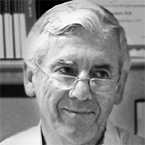
Giorgio Parmiani, MD, an internationally renowned immunologist and a longtime member of the AACR, died March 21, 2021, at the age of 82.
Parmiani was born in 1938 in Sesto San Giovanni, Italy. He earned his medical degree from Milan University in 1964. He trained in tumor immunology at the Institute for Cancer Research in Philadelphia (known today as Fox Chase Cancer Center) from 1970 to 1971.
He spent much of his career at Milan’s Istituto Nazionale Tumori (National Cancer Institute), where his positions included director of the Division of Experimental Oncology and later, deputy scientific director and director of the Department of Innovative Therapies. In 1994, he launched the PhD program in Molecular Oncology at the same institution. In 2007, he joined Milan’s San Raffaele Hospital, where he was director of the Immuno-Biotherapy Unit of the Molecular Oncology Division.
Parmiani also taught courses in immunology and oncology in universities in Italy, England, France, and the United States. He served as president of the Italian Cancer Society and he founded the Italian Network for Cancer Biotherapy and Immunotherapy in 2004, serving as the group’s first president. He also served as deputy mayor of his hometown.
Parmiani was among the first to describe and molecularly characterize the immune response against differentiation antigens in melanoma patients. He was the principal investigator of many clinical trials, and authored or co-authored approximately 500 journal articles and more than 30 book chapters. Among many career honors, he received the Richard V. Smalley Memorial Award and Lectureship from the Society for Immunotherapy of Cancer in 2008. Parmiani joined the AACR in 1972 as a Corresponding member and was a member of the Cancer Immunology Scientific Working Group. He transferred to Emeritus status in 2016.
Leave your remembrance of Dr. Parmiani below
I was sad to hear of the passing of Giorgio Parmiani. I knew Giorgio for many years, we collaborated and wrote several papers together. I will always remember him and his dedication to research in immunology and cancer. My sincere condolences to his family.